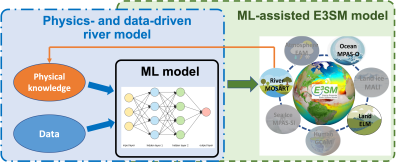Integrating Machine Learning Models into E3SM for Understanding Coastal Compound Flooding
Project Team
Principal Investigator
Coastal-urban regions in the United States are home to 40% of the nation’s total population, produce more than $9.5 trillion in goods and services, and employ 58.3 million people. They have a high concentration of infrastructure, are often economic centers, and are crucial in water and nutrient cycling. But unfortunately, these regions suffer from severe flooding, and backwater effects caused by pluvial, fluvial, and coastal processes that greatly exacerbate the flood risks. Therefore, there is an urgent need to improve understanding and simulation of backwater effects and mitigate the induced floods, and this urgency is escalating with increasing coastal development, population growth, and vulnerability of infrastructure to floods. However, coastal backwater effects are difficult to simulate because of their multiple interactive drivers and complex, interrelated land-river-ocean processes. The effects have not been well represented in the Energy Exascale Earth System Model (E3SM) partly because of insufficiency of incorporating data and deficiency in model-grid configuration. Coastal-urban regions usually have many sensors, observatories, and radars that collect vast amounts of in situ and remote sensing data. These data contain critical information about drivers, processes, and their influences on coastal flooding. To address knowledge and modeling gaps in coastal-urban regions, this project will extract information from multi-source, multi-type data; develop mesh-free, data-informed, and physics-embedded river models using machine learning methods; and couple the river model with E3SM land and ocean models to advance predictive understanding of coastal compound flooding under climate change. The project will focus on two Mid-Atlantic River Basins, the Susquehanna River Basin and the Delaware River Basin, which include significant urban areas, have more than 4 million residents, and suffer from severe coastal flooding.
This research will advance understanding of feedbacks and interactions of extreme events at coastal-urban systems, enhance E3SM capabilities in simulating coastal compound floods with uncertainty quantification, and inform urban planning to mitigate the impact of climate change on communities, infrastructures, and the economy.

